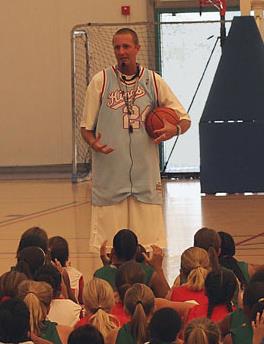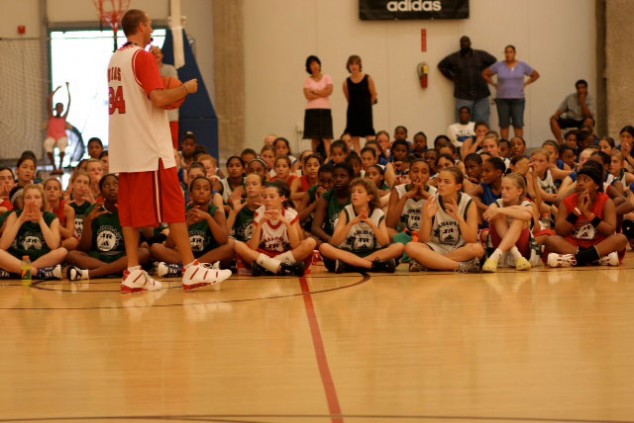

Foreword by Alex Stoddard - Interview conducted by Jarron Flynn, Alvie Stoddard and Alex Stoddard
Originally Published in Game Time Issue 2
“1. 2. 3. Lift’em!”
It’s day one of the adidas National Jr Phenom Camp in San Diego California, at Alliant International University, and all 350+ kids at the camp are lying on their backs, raising their legs, in what Coach Dave Taylor, Phenom Camp Director, calls a leg lift.
Why were they lifting? Because despite being warned, some of the campers had still left trash in the Dining Hall, after lunch. The price they had to pay was three one minute leg-lifts. For the next three days, lunch and dinner, no more trash could be found left on the floor.
On October 25th, we caught up with Coach Dave over the phone to talk with him about several different topics.
Coaching:
GAME TIME: As a coach, what qualities in younger players make them stand out from other talented players?
DT: The fundamentals. I like to see kids that play the game the right way. At the Jr. Phenom camp, we are looking for kids that display the characteristics which coaches want to see in a player, such as: being de- fensive minded; team oriented; fundamen- tally sound; pass first, shoot second point guards; and intelligent players that can sit through a film session and describe what
they are seeing. That's what puts a kid in a different stratosphere.
GAME TIME: Do you look for athleticism and Basketball IQ at the middle school level?
DT: The one thing that I do not look for is athleticism. I think that comes with age. At the middle school level the kids may not have all of the athletic skills yet, but, if they are fundamentally sound, in 4 or 5 years they will catch up to the other more athletic kids, and pass them.
What I look for are kids with high basketball I.Q, academic intelligence, good grades in school, discipline, coachablity and good speaking and writing skills. These are the characteristics that D1 and high school coaches will look for. These are the kids that are going to be successful.
GAME TIME: What specific things do you look for regarding Basketball IQ?
DT: Kids that understand the flat triangle defense, see man and ball, move without the ball, lock down the ball and who are great off the ball defender. A kid that passes and cuts and sets the screen, slides and
moves laterally and stays in his stance. Good coaches will recognize these skills.
GAME TIME: In your opinion, why is it that so many talented basketball players never make it to the college level? What qualities do you think separates the kids that do make it?
DT: The kids that do make it are the ones that are mentally tough. Mental toughness and perseverance are the most important traits to have if you want to become a successful athlete. When it comes to being a successful athlete you have to be mentally tough because you’re going to lose games, have bad games, and you’re going to fail a lot and miss a lot of shots. But the kids that are mentally tough will be able to persevere through this. The difference between a great player and a good player is intelligence and mental toughness.
GAME TIME: What should we be looking for in our coaches?
DT: As middle school players, you need a coach that provides the necessary discipline and focuses on the fundamentals.
Coaches that are tough on you: If you are arriving late to practice, not playing hard, not getting good grades then the coach should bench you.
When you get to high school the discipline required should not be foreign to the kids. In high school discipline and fortitude are required to succeed in the academics and in basketball.
GAME TIME: Do kids spend too much time on the wrong things with respect to practicing? What would you recommend for a young player who only has one hour a day to practice?
If you only have one hour to practice and you have a hoop/basket you should work on your midrange. Work on step backs or catch and shoot or shoot off the dribble. (As a kid Coach Dave always worked on his jab steps and pump fakes). Also, add push-ups and sit-ups to your workout. Always practice at game speed. To quote John Wooden, “Practice like you play.”
The difference between a D1 and D2 player is that a D1 player can shoot off of the dribble.
Phenom Camp:
GAME TIME: What are the most rewarding aspects of the Camps?
DT: The kids. On day one you can see the fear in the kids but by daythree it’s like a family. If we can reach 20% of the kids with our messages, this is a major accomplishment. These young kids (6-8th graders) play hard and there is a sense of freedom.
GAME TIME: What is the toughest challenge that you face?
DT: The toughest challenge is getting the parents to understand how to best support their kids. Parents need to let the kids fail on their own – the kids need to learn how to succeed in the game.
GAME TIME: In addition to the Phenom Camps, what are a few of the other good camps to attend for kids our age?
DT: Attend camps that are focused on skills development. Some of the best camps are run by the local high school coaches. (Parents need to do their homework on the camps – vet out the coaches that will be running the camps and their philosophy).
Expertise/Advice:
GAME TIME: In your opinion, who is, or was, the greatest forward to play the game?
DT: Magic Johnson was the best player in my opinion because he was a leader and he could handle the ball as a big guy. He could play all five positions. He was a great passer. It was important, for the team, when he played center in his rookie year during a championship game since Kareem was hurt. He always had a positive attitude and had great sportsmanship.
Magic could beat a team without shooting the ball – through his passes, defense, leadership, unselfish playing. He could play any position on the floor: 1,2,3,4,or the 5. Great leaders do what is required to win.
GAME TIME: We read the book “Play Their Hearts Out” - Do you stay in touch with any of players that were highlighted in the PLAY THEIR HEARTS OUT book?
DT: Demetrius Walker, University of New Mexico. The book was indicative of that time – there are a lot of points that needed to be elaborated on.